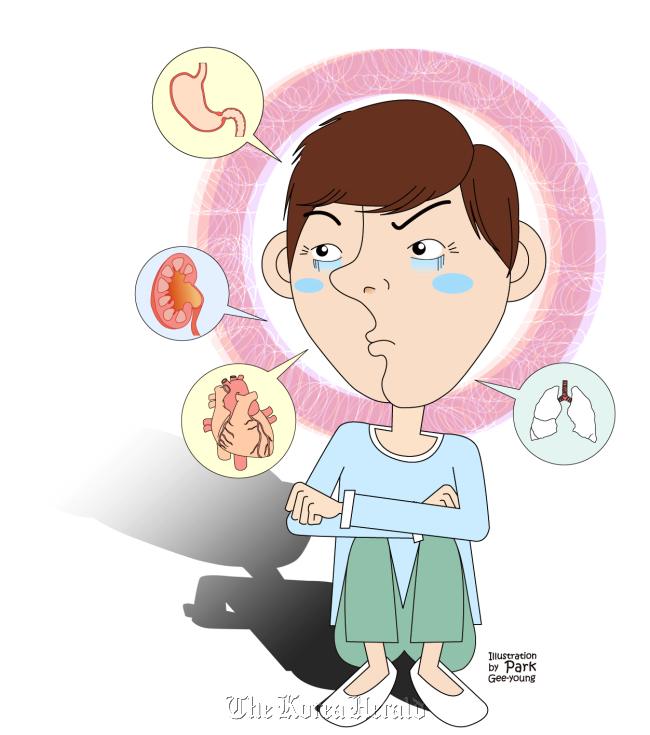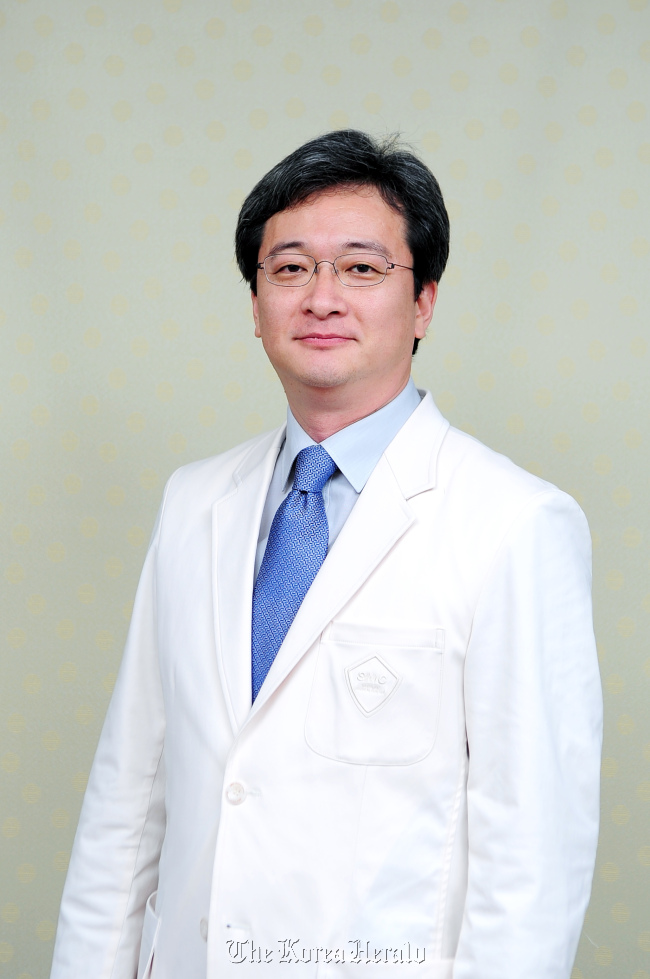There is an expression “worried sick.” Although it is just a saying for most people, for others it is quite real.
Those who worry about having a major illness regardless of being healthy, those who worry about dying any minute from sudden anxiety, those who don’t appear in front of the public in case they make mistakes, and those who continuously worry about everything that happens in their daily lives, can all suffer from anxiety along with somatization that cannot be explained by physical factors. These people have repeatedly taken various health examinations while moving from one hospital to another.
People who worry about having major illnesses regardless of the doctor confirming otherwise, and who repeat health checks at different hospitals should stop and think whether they may have hypochondria.

Hypochondria is the neurotic state where one becomes preoccupied with an unrealistic fear and belief that they have a serious illness, showing an excessive obsession with a particular symptom. Firstly, once a person comes into a state of hypochondriasis, they will not be able to let go of the obsession that they are sick, even when the doctor explains that there are no problems after examining or doing tests. Due to this, the person then sees different departments and hospitals to take all sorts of examinations, only to repeatedly hear that there are no particular problems with the body. As a result, the patient can reach the point where they can no longer have a proper home or social life, and they can fall into depression from disappointment and despair that no hospital can diagnose their diseases.
The word hypochondria comes from the word hypochondrium, which means below the ribs. The word is considered to have come from a while ago, when it was found that there were patients who were excessively obsessed with the organs or the abdominal area below the ribs; even when there was no special illness in them. Currently, 1-5 percent of the general population is presumed to be suffering from hypochondria, and 15 percent of the patients who visit the hospital are diagnosed with hypochondria. Hypochondria is found in all age groups and both genders. As it can be a temporary condition, the patient is diagnosed with it only when the symptoms of hypochondria last for more than six months.
The reason that modern society is paying attention to hypochondria is because of the concern that this condition is rising because of excessive worry about illness and health-seeking behavior incited by modern medicine. On one hand, there is the problem that people with hypochondria are not getting appropriate treatment because of the misunderstandings around hypochondria; on the other there, could be incorrect judgments that burden society and patients due to unnecessary medical practices and examinations.
Patients with hypochondria generally have a lower concentration and tolerance threshold for sensation compared to normal people, and so they have magnified sensitivity. This means that they feel an extreme amount of pain and paresthesia while normal people would, in the same situation, only feel uncomfortable. The paresthesia and pain the patient feels is real and extreme, however as examinations and checkups do not show any abnormalities; the patients are often misunderstood to be feigning illness.
Occasionally even doctors are not able to understand the symptoms explained by these patients. This is because the aspects of the symptoms mentioned are quite different and vague from the symptoms of specific diseases.
The patients, on the other hand, question why they feel so much pain when there is nothing wrong. Telling them that it is an illness of the mind and that they should visit a psychiatrist makes them more confused. Now, it needs to be understood that a special type of symptom, hypochondria, occurs when the neurotic tendency of excessive worry meets the sensitivity of the nervous system to amplify paresthesia. In addition, it needs to be accepted that there are currently no existing diagnostic methods for accurately measuring what physical sensitivity is.
In this circumstance, actual treatment is the more important than fruitless diagnosis. It is well known that taking antidepressants over long term prescribed by a psychiatrist combined with psychotherapy is the most effective way to reduce the symptoms. It is not desirable to think that antidepressants are used only because the illness is with the mind, as the antidepressant not only reduces depression and anxiety, but is also considered to work as a treatment for pain by treating the sensitiveness of the sense of the body, which becomes the basis of hypochondriasis. The majority of the cause of this condition is ‘worry’ itself, so individual or group psychotherapy or cognitive behavioral therapy to address the psychological condition can be very effective.
All physical symptoms need to be examined and tested by a doctor. However, in the case where no problems are found even after careful checkup and medical examinations, and the patient is suspected to be a hypochondriac, the patient needs help to stop the obsession over finding a diagnosis.
There is an expression ‘worry cure’. Yes, that is true. Please just find it.
Those who worry about having a major illness regardless of being healthy, those who worry about dying any minute from sudden anxiety, those who don’t appear in front of the public in case they make mistakes, and those who continuously worry about everything that happens in their daily lives, can all suffer from anxiety along with somatization that cannot be explained by physical factors. These people have repeatedly taken various health examinations while moving from one hospital to another.
People who worry about having major illnesses regardless of the doctor confirming otherwise, and who repeat health checks at different hospitals should stop and think whether they may have hypochondria.

Hypochondria is the neurotic state where one becomes preoccupied with an unrealistic fear and belief that they have a serious illness, showing an excessive obsession with a particular symptom. Firstly, once a person comes into a state of hypochondriasis, they will not be able to let go of the obsession that they are sick, even when the doctor explains that there are no problems after examining or doing tests. Due to this, the person then sees different departments and hospitals to take all sorts of examinations, only to repeatedly hear that there are no particular problems with the body. As a result, the patient can reach the point where they can no longer have a proper home or social life, and they can fall into depression from disappointment and despair that no hospital can diagnose their diseases.
The word hypochondria comes from the word hypochondrium, which means below the ribs. The word is considered to have come from a while ago, when it was found that there were patients who were excessively obsessed with the organs or the abdominal area below the ribs; even when there was no special illness in them. Currently, 1-5 percent of the general population is presumed to be suffering from hypochondria, and 15 percent of the patients who visit the hospital are diagnosed with hypochondria. Hypochondria is found in all age groups and both genders. As it can be a temporary condition, the patient is diagnosed with it only when the symptoms of hypochondria last for more than six months.
The reason that modern society is paying attention to hypochondria is because of the concern that this condition is rising because of excessive worry about illness and health-seeking behavior incited by modern medicine. On one hand, there is the problem that people with hypochondria are not getting appropriate treatment because of the misunderstandings around hypochondria; on the other there, could be incorrect judgments that burden society and patients due to unnecessary medical practices and examinations.
Patients with hypochondria generally have a lower concentration and tolerance threshold for sensation compared to normal people, and so they have magnified sensitivity. This means that they feel an extreme amount of pain and paresthesia while normal people would, in the same situation, only feel uncomfortable. The paresthesia and pain the patient feels is real and extreme, however as examinations and checkups do not show any abnormalities; the patients are often misunderstood to be feigning illness.
Occasionally even doctors are not able to understand the symptoms explained by these patients. This is because the aspects of the symptoms mentioned are quite different and vague from the symptoms of specific diseases.
The patients, on the other hand, question why they feel so much pain when there is nothing wrong. Telling them that it is an illness of the mind and that they should visit a psychiatrist makes them more confused. Now, it needs to be understood that a special type of symptom, hypochondria, occurs when the neurotic tendency of excessive worry meets the sensitivity of the nervous system to amplify paresthesia. In addition, it needs to be accepted that there are currently no existing diagnostic methods for accurately measuring what physical sensitivity is.
In this circumstance, actual treatment is the more important than fruitless diagnosis. It is well known that taking antidepressants over long term prescribed by a psychiatrist combined with psychotherapy is the most effective way to reduce the symptoms. It is not desirable to think that antidepressants are used only because the illness is with the mind, as the antidepressant not only reduces depression and anxiety, but is also considered to work as a treatment for pain by treating the sensitiveness of the sense of the body, which becomes the basis of hypochondriasis. The majority of the cause of this condition is ‘worry’ itself, so individual or group psychotherapy or cognitive behavioral therapy to address the psychological condition can be very effective.
All physical symptoms need to be examined and tested by a doctor. However, in the case where no problems are found even after careful checkup and medical examinations, and the patient is suspected to be a hypochondriac, the patient needs help to stop the obsession over finding a diagnosis.
There is an expression ‘worry cure’. Yes, that is true. Please just find it.

By Yoon Se-chang
The author is a doctor at the Department of Neuropsychiatry at Samsung Medical Center and an associate professor of Sungkyunkwan University School of Medicine. ― Ed.
-
Articles by Korea Herald


![[Exclusive] Korean military set to ban iPhones over 'security' concerns](http://res.heraldm.com/phpwas/restmb_idxmake.php?idx=644&simg=/content/image/2024/04/23/20240423050599_0.jpg&u=20240423183955)

![[Graphic News] 77% of young Koreans still financially dependent](http://res.heraldm.com/phpwas/restmb_idxmake.php?idx=644&simg=/content/image/2024/04/22/20240422050762_0.gif&u=)



![[Pressure points] Leggings in public: Fashion statement or social faux pas?](http://res.heraldm.com/phpwas/restmb_idxmake.php?idx=644&simg=/content/image/2024/04/23/20240423050669_0.jpg&u=)










